Container ship tracking is a popular method of locating the position of a container vessel on the ocean and also understanding its most recent and next activities, such as estimated arrival times, next port call, vessel status, amongst various others.
There are various websites that let you track container ships, through the vessel name, the MMSI/IMO number or through an interactive map. Vessel tracking is an important function of the supply chain, as it allows various parties to understand the location of cargo and allows them to prepare the required resources and documentation.
Content Overview:
- What Is Container Ship Tracking
- How Container Ship Tracking Works
- Best Container Ship Tracking Websites
- How to Track Container Ships
- Container Ship Tracking Information
- Importance of Container Ship Tracking
In this article, we take an in-depth look at what container ship tracking is, how to track container ships and also analyze and rank the best websites to do this.
What is Container Ship Tracking?
Container ship tracking is an activity that revolves around the process of identifying the precise location of a specific container ship on the ocean (through establishing its coordinates).
Automated Identification Systems (AIS) transmit vessel locations (latitude and longitude), which are then used to establish the status of a vessel, its speed, previous port call, voyage, next port of call, estimated time of departure and arrival, as well as various other data points.
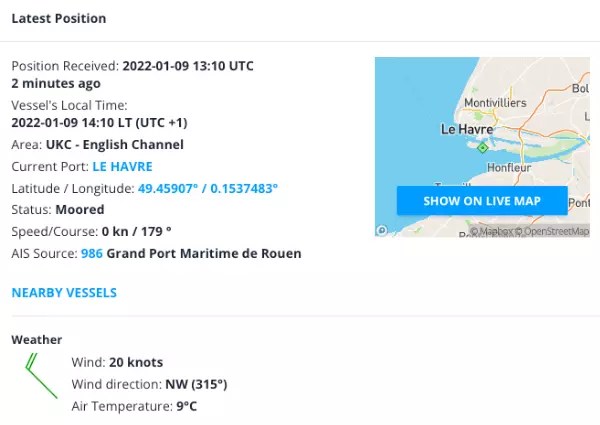
Container ship tracking websites allow users to search for container ship locations and other types of shipping information, such as IMO class, vessel type and flag, gross tonnage, year built, ownership history, tonnage, capacity, and load-line, and weather.
You can track a container ship as long as it’s equipped with an AIS and transmits the data to an appropriate receiver. This data is then processed and made available through various tracking websites.
How are Container Ships Tracked?
Certain vessels are required to be equipped with an Automated Identification Systems (AIS), which is essentially a transponder that transmits a vessel’s location and other relevant data.
As part of the standard requirements of the International Maritime Organization (IMO), the Safety of Life at Sea (SOLAS) regulation states that all cargo ships of 300 gross tonnage and more are required to have an AIS transponder that automatically sends vessel location and details.
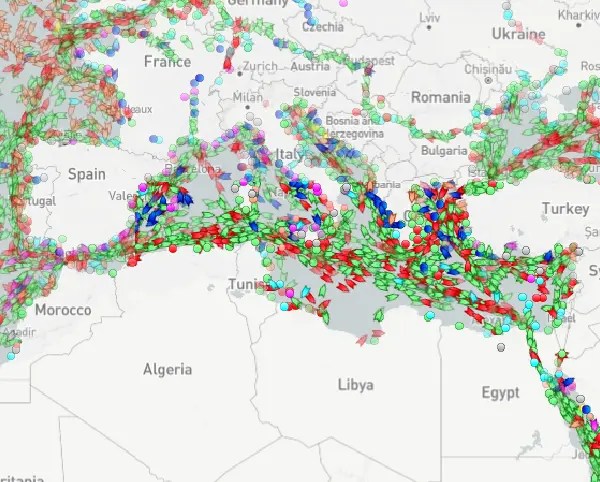
The AIS transponder regularly sends and receives important vessel information between ships and AIS base stations through a vast satellite network. The AIS transporters contain a Very High Frequency (VHF) radio unit, Global Positioning System (GPS) receiver, and computer equipment.
While satellites are used to transmit data in between vessels and base stations, a database is created that provides a wide variety of information about all vessels that are equipped with an AIS transponder.
Vessel information is commonly used by maritime authorities to monitor and track the movement of vessels, but it is also often used in the supply chain and logistics as AIS data contains vessel information, position, speed and course readings.
AIS information is also aggregated and made commercially available to companies who allow users to track container ships, as well as many other types of vessels.These tracking services are typically accessible through web browsers or apps.
Best Websites to Track Container Ships
There are several websites that allow you to track container ships that also show a wide range of other relevant shipping information. In the following section you’ll find a list of the best websites that let you track container ships.
Generally speaking, basic vessel location and information is given for free, whereby some websites may charge a subscription fee for accessing more comprehensive routing or historical data.
1. Marine Traffic

- Free Access: Yes
- Paid Access: Yes
- Live Maps: Yes
- API Data Service: Yes
- Vessel Search: Yes
- Tracking App: Yes
Marine Traffic was founded by Dimitris Lekkas and is a community-based project offering detailed vessel tracking. This container ship tracking website was launched in 2007 and has more than 2,000,000 users globally.
Marine Traffic displays basic vessel information free of charge but does charge a subscription to access more detailed voyage and vessel information and a fleet management feature. Every search is accompanied by a live map that shows an accurate position on the vessel, along with its coordinates.
There are several subscription plans with various features including maritime news and informational content through a blog. They also offer vessel tracking through a data service (via API) and offer mobile access via an iOS and Android app.
2. Vessel Finder

- Free Access: Yes
- Paid Access: Yes
- Live Maps: Yes
- API Data Service: Yes
- Vessel Search: Yes
- Tracking App: Yes
Vessel Finder is another popular vessel tracking service and was launched in 2011. Today, they provide vessel and tracking information for over 600,000 vessels and 6,000 ports worldwide. Vessel Finder offers tracking via their website and through an Android and iOS app.
Maritime news and event coverage can be found on their blog that covers topics from accidents at sea, maritime business, sea piracy and more. Maritime data is displayed via its own database and they also have an API option that allows usage of customized tracking data to third parties.
Vessel Finder offers a great amount of vessel and tracking data free of charge, while the paid plans have more features such as historical tracking data, fleet management, an ad-free tracking experience, as well as satellite and terrestrial coverage.
3. FleetMon
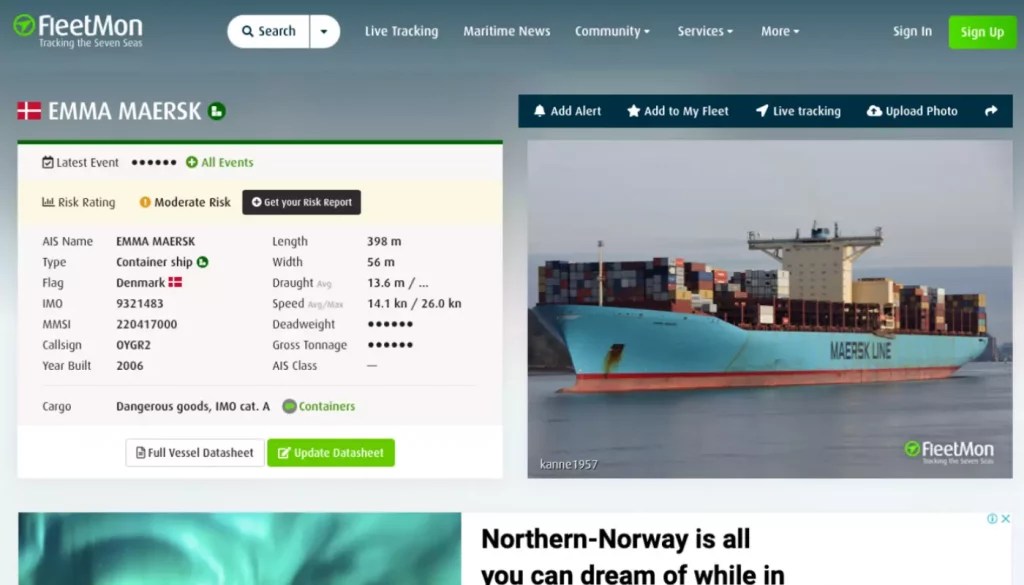
- Free Access: Yes
- Paid Access: Yes
- Live Maps: Yes
- API Data Service: Yes
- Vessel Search: Yes
- Tracking App: Yes
FleetMon provides AIS data for more than 500,000 vessels, with a steadily growing database. The company is located in Germany and was founded in 2007. Their database access has information of over 5,000 ports around the world and is able to provide comprehensive information about container ships and ports.
In addition to vessel tracking, FleetMon also offers maritime news covering major topics in the maritime industry and publishes regular information through a blog.
In terms of vessel tracking, basic information is available free of charge, whereby more specific information such as vessel data sheets, fleet management, historical and weather data or route information requires a subscription.
4. VesselTracker
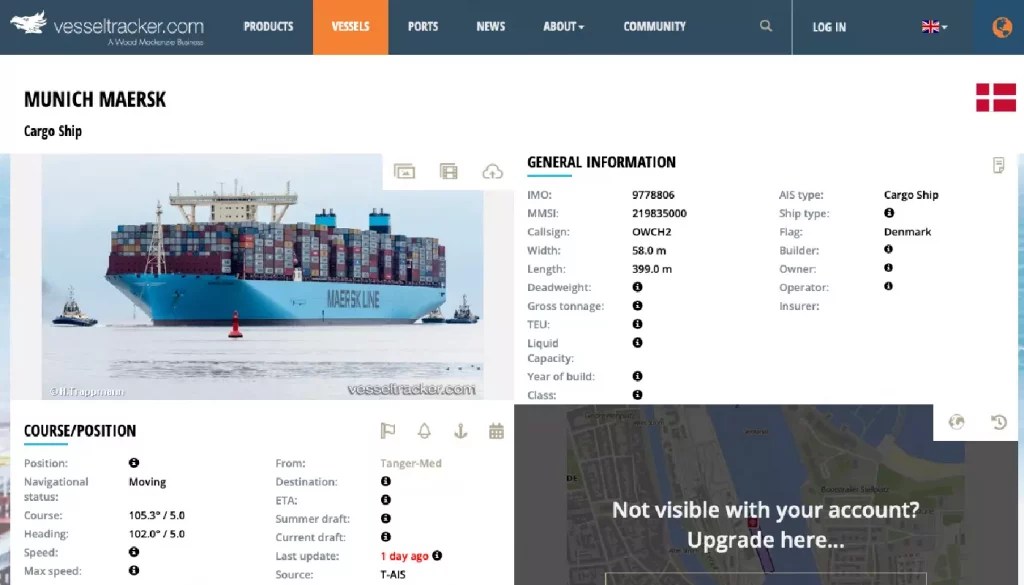
- Free Access: Yes
- Paid Access: Yes
- Live Maps: Yes
- API Data Service: Yes
- Vessel Search: Yes
- Tracking App: No
VesselTracker was founded in 2006 and has a user base of more than 250,000 users. Their vessel tracking services offer AIS information that include vessel movements, information, locations and schedules.
The website tracks more than a million vessels and ports globally with a paid option to view customized real-time and historical data. They also have a vessel reporting function that enables container ship location and status downloads.
All of their tracking services feature live information, with a live map through Google Earth and overlays such as nautical charts. VesselTracker has an API service and also allows vessel tracking through an iOS and Android app.
5. Ship Finder

- Free Access: Yes
- Paid Access: No
- Live Maps: Yes
- API Data Service: No
- Vessel Search: Yes
- Tracking App: Yes
Ship Finder is a basic vessel tracking website that allows container ship tracking through an interactive map or a search function. Along with a simple interface, it provides only basic vessel location and information.
This Information includes vessel coordinates, speed, type, call sign, destination, estimated time of arrival amongst a few others. One downside is that the search function is hard to find and takes a few clicks to reach. However, the interactive map is a great addition.
Ship Finder also has an iOS and an Android app available. All vessel tracking features are free of charge, there is no subscription or paid service available.
6. Marine Online

- Free Access: Yes
- Paid Access: No
- Live Maps: Yes
- API Data Service: No
- Vessel Search: Yes
- Tracking App: Yes
Marine Online is a Singapore-based company that offers live vessel tracking, as well as other types of services such as vessel charting, bunkering, ship supply, marine insurance, crewing, ships for sale, and other types of marine services.
This website offers access to basic and advanced container ship tracking information completely free of charge. Data fields include vessel and route information, estimated time of arrivals, next port of call and much more.
Registered users get access to fleet management functionality and also charter information such as operator and technical manager contacts. However, most tracking data is free of charge.
7. Ship Info

- Free Access: Yes
- Paid Access: No
- Live Maps: Yes
- API Data Service: No
- Vessel Search: Yes
- Tracking App: No
ShipInfo is a third-party vessel tracking website that uses the API services of Vessel Tracker and Marine Traffic. Tracking container ships can be done free of charge and no registration is required.
Images of ships are displayed using Vessel Tracker’s API, whereby route and vessel information such as the port of registry, gross tonnage and last coordinates are from Marine Traffic.Although there is a live map available, the vessel tracking information on Ship Info is relatively limited.
8. MyShipTracking
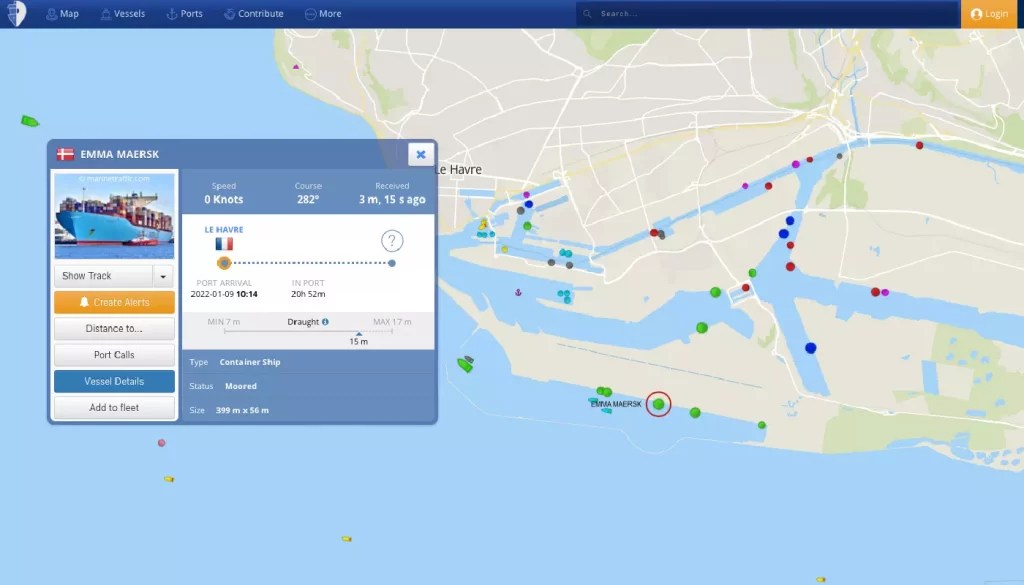
- Free Access: Yes
- Paid Access: No
- Live Maps: Yes
- API Data Service: No
- Vessel Search: Yes
- Tracking App: Yes
MyShipTracking is another basic vessel tracking website that is similar to Ship Finder. It displays a large map where vessels can be selected and important tracking information like position, speed, course, status, arrival at port amongst various others are shown.
Ports and vessels can be searched through their website or through an iOS app that is made available. There are also alert features and fleet management options for registered users. Take note that certain data is retrieved from Marine Traffic.
How to Track Container Ships
You can track container ships though online vessel tracking websites by using the search function or through an interactive map. The most common way to track a vessel is by typing in the respective name of the container ship in the search column and then searching for it.
However, there are also other ways and data points that you can use to track container ships. Below, you’ll find a list of the most common references that you can use depending on the website:
- Ship Name
- IMO Number
- MMSI Number
- Call Sign
- Voyage
What Information Do Container Ship Tracking Websites Show?
Most container ship tracking websites show vessel and route information. However, take note that not all tracking websites display the same type of information and that more detailed information may only be accessible through a subscription.
Below, you’ll find a list of the most commonly available information found on tracking websites. We’ve also made sure to provide an explanation on their meaning.
- Position – The last known location of the vessel, which is indicated through coordinates (longitude and latitude) and/or an interactive map.
- Status – Shows the actual status of the container ship. Depending on the tracking website, it may display several statuses such as anchored, moored, underway, at port, etc.
- Estimated Arrival – The estimated time of arrival at which the vessel is intended to arrive at the next port call.
- Speed – The speed of the vessel, which is measured in knots. 1 knot is equivalent to about 1.15 mph or 1.85 km/h.
- Port Calls – Shows the actual arrival time and dates of each port call of the vessel. Some websites also show the length of stay, which is measured in days.
- Weather – An indication of the current weather conditions. Oftentimes, also the wind speed is indicated – typically in knots. Wind direction and air temperature are also commonly included in this metric.
- IMO – Each vessel will have an The International Maritime Organization (IMO) number, a requirement that was introduced in 1987. This is a unique number assigned to each vessel.
- Vessel Name – The name of the vessel as part of the fleet of the shipping company. For example Maersk Emma or MSC Diana.
- Vessel Type – The type of vessel, for example a cargo vessel, container ship, tanker, passenger, high-speed craft, tugboat, special craft, fishing boat, or yacht.
- MMSI – The Maritime Mobile Service Industry (MMSI) number is a unique nine-digit number and is used during distress alerts or maritime emergencies.
- Call Sign – An alphanumeric code to identify a specific vessel. For example, the Maersk Emma has the call sign OYGR2.
- Flag – The country where the vessel is registered and under which justitiction it’s operating under.
- Gross Tonnage – The container ship’s overall internal volume. Not to be confused with net tonnage, which is the cargo weight.
- Length – The overall length of the vessel, typically indicated in meters.
- Built – The year the ship was built.
- Last Received – An indication when the last AIS signal was received from the vessel, which is typically indicated in minutes, hours and days.
- Owner – The operator of the vessel or the registered owner. Sometimes the operator’s name is found in the vessel name. One example is Emma Maersk, which is the name of the vessel and Maersk is the owner; formally Moller-Maersk.
Importance to Container Ship Tracking
Tracking container ships has become an increasingly important function of supply chain management. There are various other important functions such as container tracking that depend on assessing vessel locations based on AIS data.
Knowing where a container ship is (through identifying it’s longitude and latitude coordinates) allows supply chain planners to project cargo arrival times, plan and engage the required resources and vendors, as well as prepare any type of relevant shipping documentation.

Get Free Course Access
If you enjoyed the article, don’t miss out on our free supply chain courses that help you stay ahead in your industry.
Explore Courses

Gerrit Poel
Co-Founder & Writer
at freightcourse
About the Author
Gerrit is a certified international supply chain management professional with 16 years of industry experience, having worked for one of the largest global freight forwarders.
As the co-founder of freightcourse, he’s committed to his passion for serving as a source of education and information on various supply chain topics.